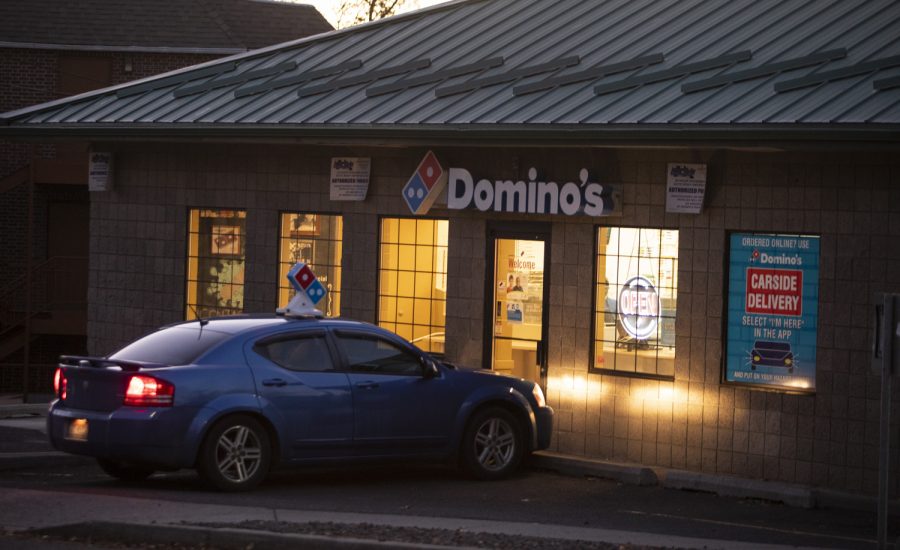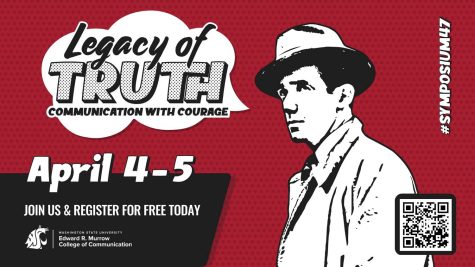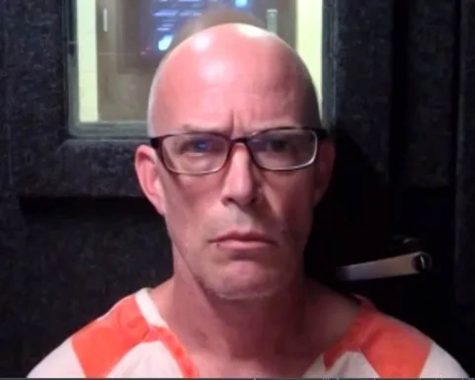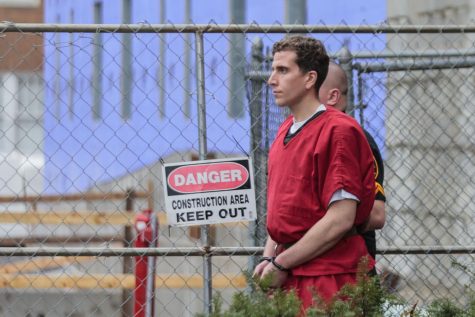- Breaking News
- COVID-19
- Crime
- Environment
- Features
- Local
- News
- Pullman Community
- Safety
- TOP FEATURES
- WSU Pullman campus
Employees allege COVID-19 safety, labor law violations at Pullman Domino’s
Mask use is not enforced, sanitation is infrequent; workers are guilted for taking breaks, shamed into tipping
Pullman Domino’s Pizza customers have complained about lack of mask use by employees. Customers not wearing masks are still offered service. An employee alleged that managerial staff knowingly disregards COVID mandates.
December 3, 2020
Editor’s note: Some sources in this story elected to use pseudonyms in order to protect their anonymity and prevent retaliation. These sources are designated by an asterisk (*).
Pullman Domino’s Pizza allegedly violated several COVID-19 regulations, including mask use, frequent sanitization and not having protective barriers between workstations.
Employees are also allegedly guilted for taking or requesting breaks during long shifts, and forced to contribute to a tip pool where salaried employees allegedly receive tips, which is against Washington law.
The Daily Evergreen received a seven-page complaint from 10 current and former Domino’s employees citing multiple violations of COVID-19 regulations and labor laws.
Daily Evergreen reporters made numerous attempts to contact owner Scott Bulkley and general manager Rosa Cardenas of Pullman Domino’s. Both individuals denied requests for interviews.
COVID-19 violations
Employees are required to wear masks while working, have their temperatures checked before clocking in, and have physical barriers between workstations if social distancing is not possible, according to COVID-19 requirements from Washington State Department of Labor and Industries.
L&I is a state agency that oversees workplace health and safety.
Domino’s corporate requires employees to wear masks at all times while on shift, said former employee Jodie Brotherton. However, employees are rarely reprimanded when they wear masks incorrectly or do not wear them at all.
Brotherton worked at Domino’s from September 2019 to May 2020.
“I have seen a lot of managers not only drop the ball on enforcing safe social distancing and safe personal protection wearing in the store for customers,” she said, “but they have also failed to have consistent compliance with employees.”
One employee, who was not wearing a mask, was working near the belt oven where finished pizzas come out, Brotherton said.
“In terms of risk, [that employee was] in the riskiest area to be doing that,” she said.
Managerial staff are very lenient when enforcing mask use, said Aaron*, an employee who chose to remain anonymous to prevent retaliation.
Favored employees will commonly not be told to put on or fix their mask while in the presence of managers, but less favored employees will be told to do so, they said.
Customers have complained about employee mask use to the managerial staff, Aaron said. Mask use is also not enforced upon customers entering the store. Some customers will be helped even if they are not wearing masks.
Aaron said they think the managerial staff at Domino’s knowingly and willingly disregard COVID-19 mandates.
Employees are often told to check their own temperatures. Sometimes temperature checks occur an hour or more into an employee’s shift, instead of being done before they start working, Aaron said.
Employees did not receive any training about COVID-19 protocols, Brotherton said. Instead, they were told to sign a document saying they had been trained on sanitation practices when they had not been trained.
“There was actually a point when I argued with management because I said, ‘I don’t feel comfortable signing this, I haven’t received this whole training,’” Brotherton said. “‘I don’t feel confident in my ability to do this the way corporate wants us to, so we can make sure things are safe.’”
Domino’s has a menu board in the front of the store stating the restaurant is sanitized every hour. However, managers do not enforce sanitation protocols on a regular basis, Aaron said. Additionally, not all delivery drivers clean their hands after every run, even though they are supposed to.
Domino’s does not have a plastic shield at the register separating customers from employees, said Myles*, an employee who chose to remain anonymous to prevent retaliation.
“I’d feel a lot more secure with a plastic barrier there as an extra precaution because masks don’t do everything,” Myles said, “but the upper management has said, ‘No, we don’t want to install this, it’s just a waste of money.’”
It is not possible to properly social distance while working within the store because there is not enough space, Aaron said.
Five employees tested positive for COVID-19, Aaron said. Two were asymptomatic, and they were not working when they contracted the virus. However, the other three worked until they got tested, even while some of them displayed symptoms.
Some employees, including managers, came into work while their roommates were quarantining after being tested, Aaron said. They all tested negative but did not take the necessary precautions to prevent possible exposure to others.
“In the end, everyone tested negative, but the point is that they had no plan, no course of action on what to do if most of management did get sick,” Aaron said.
The Coug closed on June 25 after an employee tested positive for COVID-19, according to The Daily Evergreen. It reopened June 30 after employees were quarantined and tested.
The Domino’s store closed once for a deep clean, Aaron said.
Christopher Kinnaird began working at Domino’s as a delivery driver in the summer of 2019. Kinnaird said employees were treated scornfully when they called out sick, before and during the pandemic.
Wage violations and other employee complaints
Kinnaird said he was not trained properly when he began working. He accompanied an experienced employee for two delivery runs before delivering orders alone. He was also required to work the pizza oven without previous training during a busy day.
Kinnaird said he has been berated and cursed at by managerial staff.
Delivery drivers are required to close two days a week, Kinnaird said. However, some employees were not required to close because they were considered “favorites.”
Closing requires all orders to be completed and delivered. Employees must also clean all dishes, floors, counters and the lobby, he said.
Sometimes only two employees are scheduled to close, he said. Closing can take between two to three hours.
“We would end up with these three tubs of dishes … we have to do … by hand,” he said. “There’s just cornflower everywhere, it is just an incredible cleanup.”
Kinnaird said he did not want to close anymore after beginning graduate school because it requires him to work early hours, so also working late hours is not feasible. The general manager accommodated Kinnaird’s schedule for about five months, in which he was working from 5-11 p.m.
After being told the schedule would no longer work, Kinnaird said he told the general manager that he would collect unemployment if he was fired. He was told that he was not fired, but he might not be “right” for the job.
Kinnaird was taken off the Domino’s schedule around mid-October, but he was still able to occasionally pick up shifts. He has not worked any shifts in about a month, he said.
Kinnaird believes he was “soft” fired because he was not explicitly told he was fired, but he is no longer on the schedule.
Drivers are expected to “tip out,” or give a portion of their tip money to the inside workers after their shifts, Kinnaird said. Because of this, some drivers who are known to tip out are favored to deliver large orders because it usually results in a bigger tip. This leads to insider workers receiving a larger portion of the tip money.
“Some of us drivers are really poor … and sometimes we can’t afford to tip out,” he said. “We shouldn’t be punished for that, it should all be anonymous.”
Drivers should not be forced to tip out because they have to cover the cost of maintenance, insurance and sometimes gas for their vehicles, Kinnaird said. Drivers accept that cost when they get hired, while inside workers accept that they are not guaranteed tips.
Former employee Tyler Kirshner believes he was fired for an incident where managers accused him of not tipping out.
Kirshner delivered a large order and was given a $250 tip. When he returned to Domino’s, the general manager told him a majority of the tip should be given to the people working inside, he said.
The manager berated him for about 45 minutes for not giving a high enough percentage to the inside staff, Kirshner said. Later, the manager fired him.
He said he appealed his firing and was told he was not fired. However, when Kirshner said he might need to hire a lawyer for the issue, he was told he was, in fact, fired.
“It was a greater issue than just [this] isolated incident,” Kirshner said.
Some employees on salary, such as managers, are accepting tips from the tip pool, Aaron said. The pool is accumulated from customer tips and drivers tipping out.
It is illegal for salaried employees to collect from the tip pool, according to Washington law.
Drivers and insiders, specifically managers that work as insiders, have gotten into verbal arguments about tipping out, Aaron said. On one occasion, an employee told other employees that a specific driver allegedly did not tip out.
Aaron said they think this led to the general manager sending an email to all employees about tipping.
“Again so there is no confusion, there is no legal requirement to tip out, but you are very strongly encouraged to show your appreciation,” the manager wrote in the email.
Drivers accused of not tipping out were then scheduled to work non-transferable shifts inside. Aaron said this was likely retaliatory.
It is common for workers to leave Domino’s and start working at Jimmy John’s, Kirshner said. Jimmy John’s has consistent scheduling and fair tipping practices unlike Domino’s.
“[Jimmy John’s] follows the rules by the book,” he said, “Versus creating a new rule book every day.”
Temperatures inside of Domino’s were around 100 degrees during the summer because of old insulation, Aaron said. This led to some employees getting sick during summer and winter when temperatures are extreme.
Employees are guilted for taking breaks, Myles said. They have worked 12-hour shifts with only one 30 minute break, or sometimes, no breaks at all.
It is required for employees to take one paid 10-minute break for every four hours worked, according to Washington law.
Kirshner said employees who request breaks are told they are “sinking the ship” or “not being a team player.”
Filing complaints
L&I received a high amount of COVID-related complaints over the summer, said Tim Church, Washington State L&I public affairs manager. The number of complaints decreased for a while but increased again to over 500 complaints a day around Nov. 16 when Gov. Jay Inslee reimposed safety restrictions within the state.
Businesses must have signs on their windows or doors indicating masks are required upon entry. There should also be marks designating proper social distancing, he said.
“The requirements involving coronavirus are no different than any other workplace safety and health requirements,” he said. “It is not a request or suggestion, they are requirements.”
Several common COVID-related complaints involve businesses operating when prohibited, improper mask use, and lack of social distancing, Church said.
Individuals can file complaints on Washingtons’s coronavirus website. When a complaint is filed, the form will be forwarded to the State Emergency Operations Center and then sent to the appropriate agency to handle that complaint, Church said. Individuals can also anonymously file a complaint directly through the L&I website.
“You cannot retaliate under the law for somebody filing a safety and health complaint,” he said. “If we find out there’s retaliation, a place can get in trouble for that as well.”
The type of complaint often determines the speed in which it is handled, Church said.
Complaints about mask use or social distancing usually lead to L&I investigators first contacting a business by phone or email, he said. The investigators may also send cease and desist letters. These investigations take longer than complaints made about employee safety or refusal to comply.
If a complaint is made about worker safety, where an employee states they do not feel safe at their place of employment, businesses do not receive a warning. Instead, an immediate inspection is conducted. If the business is found in violation of regulations, it can be cited and fined, he said.
Two employees said they filed complaints against Domino’s with Occupational Safety and Health Administration, which is a division under L&I.
About 20 businesses in Washington have been cited and fined for violating COVID-related regulations, Church said. None of the businesses are located in Pullman. Colfax Zip’s Drive-In was fined in October for multiple violations.
“We want to hear from employees,” Church said. “No one should have to go to work with the fear that they’re not going to come home as healthy as they went to work that day.”
















L • Dec 6, 2020 at 11:43 am
I would like to also add to the comment I had posted previously;
I worked there from 2015-2016. For about 3 months of that, I worked as an assistant manager under the former general manager. At the time, we were wage-earners, only getting one dollar more than the inside staff(11/hr). We weren’t given any proper management training, we were chosen based on personality alone, really. I don’t think I was really ready for management but I was asked multiple times because I was nice and had a decent work ethic. There were far better options, but people didn’t like them because they were loud and abrasive– those people just weren’t considered for that.
I was given the day time manager position after the previous one quit for maternity reasons. Day time was far more relaxed, compared to the night time that is probably described here. We focused more on prep for the night shift, though sometimes we were slammed unexpectedly and ended up having to stay hours late to finish everything we needed to do. Without breaks, without the crew pie as formerly mentioned. We were limited on staff, often just myself on make-line and two drivers, though depending on the season and the projected numbers we might’ve had an extra on the inside. This meant if we were slammed we were basically on our own because most of the force was on the nighttime shift.
There was one morning that both of my drivers called in. One was sick, I can’t remember the other reason–possibly sick. I was able to get one person to come in and help but no one else was willing to cover the other. So I asked our GM at the time to come help– he prefered driving to inside work anyway– and he basically told me this person had to come in and work, that he wasn’t going to come in and assist us. I ended up having to beg the sick driver to come in despite my better judgement because it was just going to be too busy that day via projections. I hated every single bit of it. I’m just lucky the employee wasn’t mad at me, personally. He understood how desperate I was.
There is also the day the pipe burst down on Grand. We were on a separate line but our water was dirty and cold for the majority of the day. We were told that is was fine, but hot water is key to hand washing. Not that very many people washed their hands– no time for that. Most people opted for the sanitizer. Even before COVID, drivers and inside staff were supposed to wash hands frequently. The handwash sink was over by the make line, which made it difficult for drivers to do so.
EVERYTHING gets overlooked because people get exhausted working at this place, by the lower management and the employees alike. They’re overworked and underappreciated. The management does nothing to make it better. While I was there, the assistant managers tried– but a majority of them walked out on one night, think it was syllabus week for the college. I left about 3 days later and followed them to Jimmy John’s, something I don’t regret. The owners made it clear that we were not welcomed back after walking out. So I have no qualms about saying any of this.
The problem with Dominoes is definitely top-down. The owners don’t care. Unless they changed ownership, they live down in Lewiston and I don’t think I ever saw them in Pullman. They liked the money the Pullman store brought– hundreds of thousands of customers each week thanks to the students on Greek Row. They don’t care about the conditions of the store and its employees as long as they got their money.
I refuse to ever purchase from Domino’s in the region ever again. Only rarely have I. Pizza Hut is better, anyway. And Jimmy Johns is a WONDERFUL place to work and support. So if anyone sees these comments, DO NOT SUPPORT THIS PLACE. They don’t deserve your money, time, or admiration.
L • Dec 6, 2020 at 10:39 am
I worked at this dominoes for a time. I’m not surprised at all that this is coming out.
They refused to give us breaks, took away our required “crew pie”– a single large pizza that is supposed to feed 15+staff members in the shift, so not enough to feed everyone anyway. I cant speak to the tips situation.
If you’re looking for a job in pullman, apply for Jimmy John’s. Getting a break on Greek row can be hard but jimmy John’s won’t say no or guilt you if you request it.